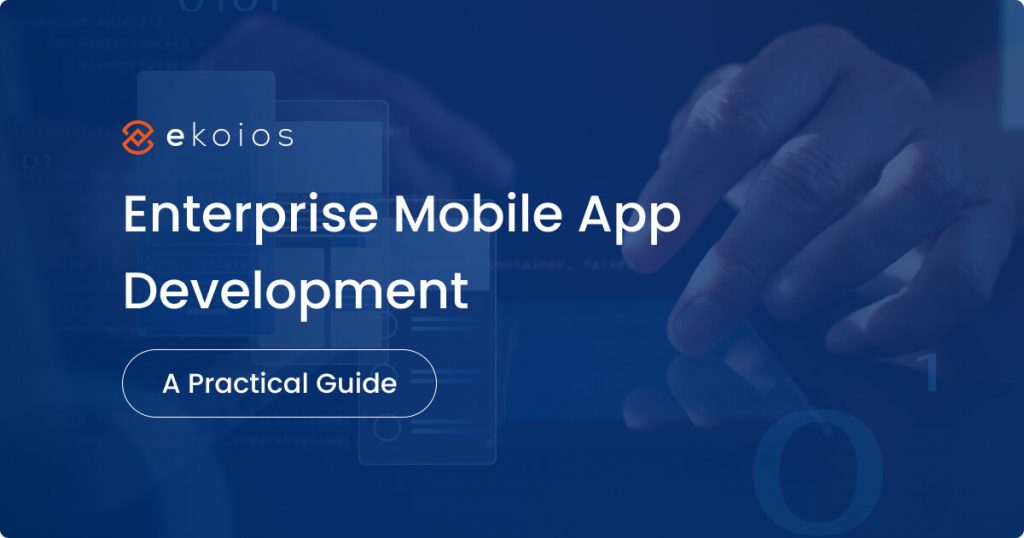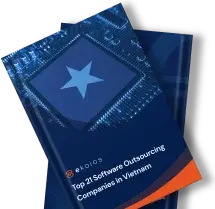Mobile devices have revolutionized the way businesses operate, with enterprise mobile apps enabling companies to leverage the devices their employees already own to increase operational efficiency and productivity. Compared to traditional desktop applications, mobile apps offer users greater convenience, and for businesses, the ability to tailor the apps to their specific needs.
Creating enterprise mobile apps that are secure, user-friendly, and high-performing is not an impossible task, if you follow the best practices for software development.
What do those entail? Let’s find out with our practical guide, with input from experts with over a decade of experience providing enterprise mobile app development services.
What are enterprise mobile applications?
Enterprise mobile applications, also known as business mobile applications, are software applications specifically designed and developed to meet the needs and requirements of businesses and organizations. These applications are intended to improve productivity, streamline processes, and enhance communication within an enterprise
The biggest companies on the planet have picked up mobile applications. Check out the examples below!

Enterprise apps must be able to handle large databases, complex workflows, and high-level security protocols to serve a large number of users performing different business tasks simultaneously.
Types of enterprise mobile apps
According to Allied Market Research, the global enterprise mobile app development platform market was valued at $238.36 billion in 2020 and is expected to grow to $527.40 billion by 2030. Another research by Fliplet stated that 87% of companies are dependent on employees’ access to work on mobile – so there is a high chance that yours are as well!
Common mobile enterprise apps that we see, experience, and develop are:
- Enterprise Resource Planning (ERP): designed to help businesses manage their day-to-day operation, with features such as inventory management, order processing, and accounting.
- Human Resources (HR) Management: allows companies to manage employee data, track attendance, and process payroll, as well as provide tools for performance evaluation and employee engagement.
- Business Management: offers a range of features to help businesses streamline their processes and stay organized such as project management time tracking, and collaboration tools.
- Team Communication: designed to facilitate collaboration between team members with messaging capabilities, file sharing, and task management.
- Customer Relationship Management (CRM): used to manage customer interactions across multiple channels with lead tracking, contact management, and sales forecasting features.
- Content Management System (CMS): allows users to create, edit, and publish content on mobiles, and provides analytics insights such as website traffic and user behavior.
- Billing System: simplifies the process of invoicing customers and tracking payments. They may also offer features such as payment reminders and expense tracking to help businesses keep their finances in order.
Benefits of custom enterprise mobile app development
With the combined force, these apps help businesses improve efficiency, productivity, and customer satisfaction – to stay competitive in today’s fast-paced digital environment. The key benefits include:
- Universal accessibility: With enterprise mobile apps, employees can access important business information from anywhere, at any time. This means they can stay connected and productive even when they are on the go.
- Increased efficiency: Enterprise mobile apps can automate many tasks that were previously done manually, such as data entry and invoice processing. This can help businesses save time and reduce errors.
- Enhanced collaboration: Team Communication and Business Management mobile apps allow team members to collaborate in real time, regardless of their location. This makes it easier for teams to share information and work on projects. Meanwhile, HR apps are great for boosting employee engagement.
- Better customer service: CRM mobile apps enable businesses to provide better customer service by allowing them to track and optimize interactions with customers across multiple channels. It also ensures that customers receive timely responses to their inquiries.
- Improved decision-making: Most apps are equipped with all-time analytics that can be used to make informed decisions about the company’s business strategy in multiple aspects.
📌 Read more: Benefits of Native Mobile App Development

What to consider when developing an enterprise mobile app
1. Business goals
It is critical to first define your development objectives, including the problems they will address and the benefits to your business. When creating a mobile app for internal use, consider your employees’ expectations and needs to see how the mobile app can fulfill them.
2. System compatibility
It’s highly likely that your company already established a system for regular operations. Therefore, your new mobile app must adapt to the existing system, and facilitate future upgrades. Pay close attention to the infrastructure, technology stack, and third-party integrations.
3. Enterprise Apps must-have features
While the complete set of features varies among apps depending on their purposes, there are some that you really can’t miss! These include:
- User roles to ensure different levels of access to the app’s features and data.
- Data management involves using a database or cloud solutions to store and retrieve information.
- Messaging for easy communication, with added privacy
- Push notification to alert users of new messages or real-time updates
- Offline mode allows users to continue using the app even when they are not connected to the internet.
- Analytics to provide reports and insights into business performance, and how users are interacting with the app
- Security layers to protect sensitive business data. This may include user authentication, data encryption, and secure server connections.
4. Mobile App Technology
Modern technologies have widened the horizons of what a mobile app can do, and the enterprise sector is no exception. Keep an eye on these on-the-rise techs:
- Artificial intelligence (AI): the most powerful tool to enhance the user experience and streamline all aspects of business operations.
- Blockchain: a real-time, multiple sources, decentralized ledger with complete trust and transparency.
- Cloud computing: the most reliable and cost-effective approach to data management
- Big data: a great resource to gain insights for data-driven decision-making and business strategy
5. Development time & cost
The average cost of developing an enterprise mobile app can range from $30,000 for a simple app to $500,000 for a full-featured app, and the average time can be from 2 months to a year. Unfortunately, no experts can give you an exact number until they know your full list of requirements. The main affecting factors are:
- Mobile app types: choose to build your app natively on Android & iOS, or go hybrid/cross-platform.
- Technology stack: based on the business requirements, this is the combination of programming languages, databases, and frameworks used to create your application. Want to see what the tech stack of your enterprise mobile app looks like?
- UI/UX design: consider using templates or custom design services. While the former is great for quick prototyping and simple apps, enterprise apps usually call for custom services due to their specific set of features.
- Project timeline: The quote for projects with tight deadlines is usually much higher than those with reasonable timelines, as they require more dedicated and experienced resources.
- Development method: There are three options: building an in-house team, working with freelancers, and outsourcing to an enterprise mobile app development company. Building an in-house team may be ideal if your project runs for several years, or else the cost won’t cut it. Working with freelancers is the most cost-effective choice but can sometimes be unreliable and time-consuming. And lastly, outsourcing seems to be the best option if you are looking for high-quality products at a reasonable price tag.
- Development location: Location plays an important part in deciding the budget for your web application. Take a look at the average hourly rates in 6 main software development hubs worldwide and do the math yourself!
For an in-depth look into the matter, visit our detailed guide on web app development cost (2023 updated). Sneak peek: software outsourcing is truly the life hack of the decade!

Enterprise mobile app development process
The standard software development life cycle also applies to enterprise mobile apps. Which means, the general steps are as follows:
- Discovery: It is important to determine your expectations for the solution in order to identify the necessary features. You may want to conduct surveys with your employees to gather ideas about what is most needed in your company, then list out must-have and nice-to-have functionality.
- Technical Assessment: Your enterprise has its own back-end systems that are unlikely to change in the near future due to high costs and requirements. Therefore, you should assess how the mobile application can work with your current resources, and define the platform for enterprise mobile app development.
- Prototyping: During this stage, developers and designers work together to create wireframes and prototypes of the software. This is necessary to help you see what the solution looks like and develop a basic MVP to try out the app.
- UI/UX Design: This step defines user flows, and how the mobile app design can provide users with the best possible experience. Therefore, conducting in-depth user research and testing various approaches is important. Looking for UI/UX design service?
- Development: The longest and most critical stage of the process. It involves setting up databases, APIs, servers, and other components for the back end, as well as coding the front end earlier defined in stage 4.
- Quality Assurance (QA): QA engineers hunt down bugs and errors, ensuring all functions work correctly and the final product passes the user acceptance test. Looking for QA & testing service?
- Deployment: All servers are launched, and people can now try out the software in their work. In most cases, this step also involves uploading the app onto the platforms’ App Store. However, some companies might distribute the app via FTP servers.
- Maintenance and Updates: As important as the development process, a product requires Your software, and infrastructure cannot work on its own. They require constant monitoring and updates to ensure everything works efficiently and meets the growing demand.
Final words
Enterprise mobile app development is essential to increase productivity, enhance employee satisfaction, reduce expenses, and stay ahead in the market. Although it comes with its own set of challenges, the benefits it brings make it a worthwhile investment.
Proper preparation, and partnering with the right development team can ensure a successful and stress-free journey for the business. Are you ready to explore your options? Contact our team of app development experts!



